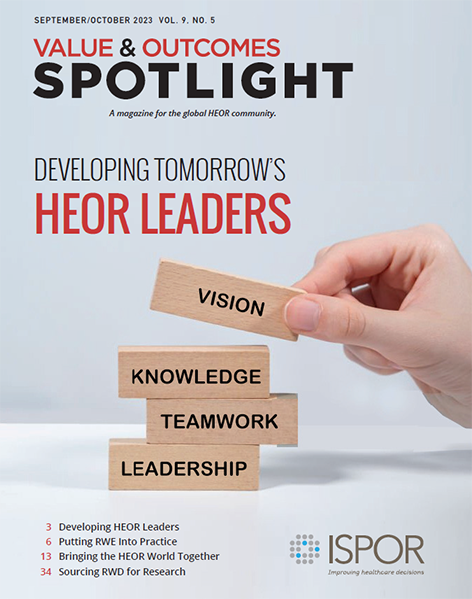Cultivating Core Competencies in Health Economics and Outcomes Research
Rob Abbott, ISPOR CEO & Executive Director

In 1990, two of the world’s leading experts on business strategy, C.K. Prahalad and Gary Hamel, published a book that would have—and continues to have—a significant impact on my thinking about how to create enduring value in an organization. The book was titled, The Core Competence of the Corporation, and the central idea was that a company must define, cultivate, and exploit its core competencies to succeed against its competitors. Those competencies are the resources and capabilities that collectively comprise or create strategic advantage. One can think of them as “the collective learning in the organization, especially the capacity to coordinate diverse production skills and integrate streams of technologies.” Microsoft, for example, has cultivated expertise in many expressions of IT that have been difficult for competitors to replicate. This, in turn, has continually reinforced Microsoft’s strategic advantage in the market.
"The relevance of core competencies is not limited to business; the theory and practice of cultivating core competencies is every bit as important in the public and not-for-profit sectors."
The passage of time has only burnished the relevance and impact of the core competence theory. In fact, many of the more popular management books of the past 3 decades—Good to Great, Blue Ocean Strategy, Black Box Thinking and others— owe more than a little debt to the pathbreaking work of Prahalad and Hamel. Equally, the relevance of core competencies is not limited to business; the theory and practice of cultivating core competencies is every bit as important in the public and not-for-profit sectors. All of which brings me to the theme of this month’s issue of Value and Outcomes Spotlight, and the opportunity it affords to consider the Health Economics and Outcomes Research (HEOR) Competencies Framework™ initiative.
ISPOR’s Institutional Council and Faculty Advisor Council have been actively leading an effort for several years now to articulate a core competencies framework for HEOR. The overarching objectives of their work has been to define:
- Competencies that professionals need for success in the field of HEOR;
- Competency gaps that are often seen in candidates and employees; and
- Training and education gaps that need to be addressed.
ISPOR published its Health Economics and Outcomes Research (HEOR) Competencies Framework™ in the September 2020 issue of Value in Health. The report, “Competencies for Professionals in Health Economics and Outcomes Research: The ISPOR Health Economics and Outcomes Research Competencies Framework,” was the first large-scale effort to formally identify competencies from within the HEOR field. These competencies can serve as a tool to guide academic curricula, fellowships, and continuing education programs, as well as the assessment of job candidates for HEOR career opportunities. The framework can also provide HEOR professionals with a valuable resource to help guide their professional development. The first tranche of core competencies is highlighted on the ISPOR website (www.ispor.org/strategic-initiatives/more/heor-competencies-framework) and discussed more fully in several of the papers contained in this issue of Value & Outcomes Spotlight. They are:
- Business management
- Economic evaluation
- Study approaches
- Clinical outcomes
- Career development
- Health policy and regulatory affairs
- Patient-centered research
- Health technology assessment
- Organizational practices
- Communications and influence
- Health service delivery and process of care
- Methodological and statistical research
- Epidemiology and public health
What is striking about this list of competencies is the breadth—as well as the depth—of experience and expertise that is needed to truly bring value to healthcare decision making. This will only become more urgent as our profession seeks to make a meaningful contribution to the big, complex health challenges of our time: affordability, the impact of digitalization on health, and the growing interest in “whole” health.
I am grateful to the efforts of the many ISPOR members who have contributed to the HEOR Competencies Framework™ initiative and pledge my support as your CEO & Executive Director to support continued development and refinement of the Framework, and to communicate its value to anyone interested in improving healthcare decisions.

